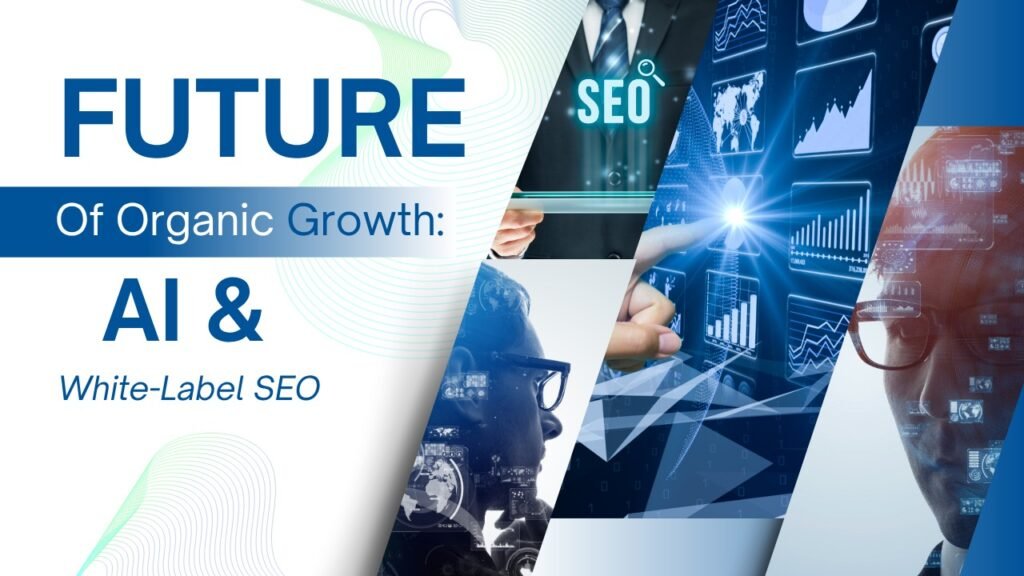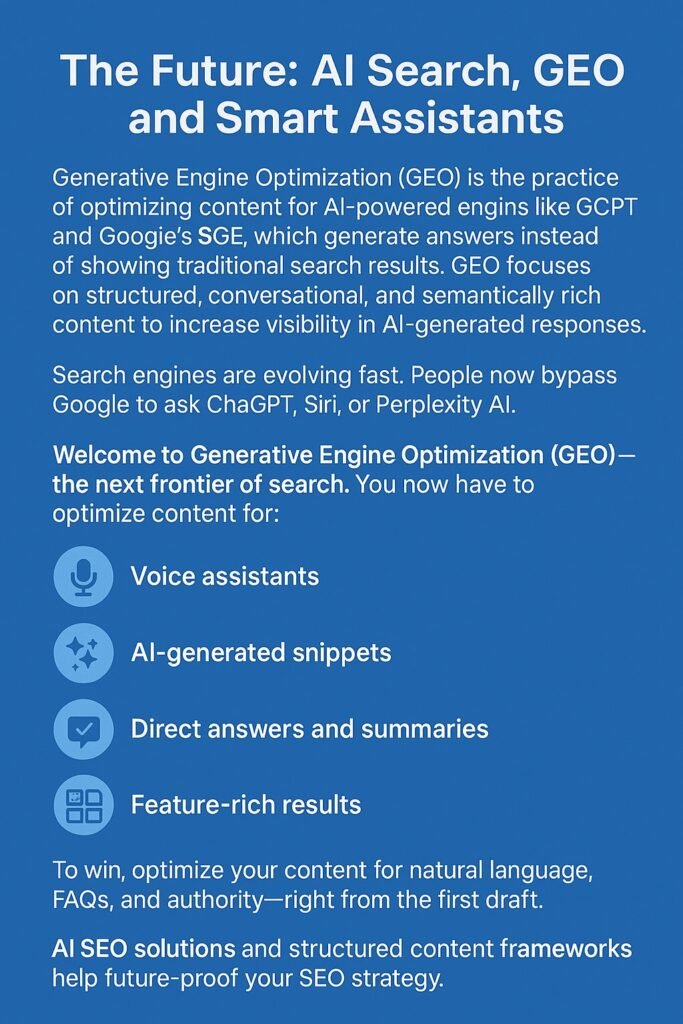
Organic growth is no longer just about optimizing title tags and writing blog posts. In 2025, it’s about understanding intent, automation, AI, and delivering scalable solutions for both agencies and brands. Whether you’re an SEO agency juggling multiple clients or a brand trying to stay ahead, AI SEO solutions and white-label SEO services offer the scalability and precision you need.
What is White-Label SEO?
White-label SEO refers to SEO services provided by one company. These services are then rebranded and sold by another company as their own. This model allows digital agencies, freelancers, or marketing firms to offer SEO solutions like keyword research and link building. It also includes technical audits and content optimization, without doing the work in-house.
Rethink SEO: What Worked Before Won’t Win Today
SEO in 2025 isn’t what it used to be. The old tricks don’t work anymore. Ranking takes more than keywords and backlinks. You need speed, scalability, and smarts. That’s where AI SEO solutions and white-label SEO services come in. They’re transforming how agencies and brands grow online faster, smarter, and with better results. If you’re struggling to scale or stuck doing SEO the hard way, this blog is for you.
What Is AI SEO, and Why Does It Matter?
AI SEO solutions use artificial intelligence to automate and improve everything from keyword research to content optimization. It’s not just a tool; it’s a full-blown assistant. AI platforms can:
- Analyze thousands of keywords in seconds
- Spot content gaps in your competitors’ sites
- Suggest headings, meta tags, and even internal links
- Adapt to algorithm changes instantly
- For agencies, this means you can serve more clients with fewer resources. For brands, you get faster results without sacrificing quality. Voice Search Optimization, semantic search, and automated keyword clustering? AI handles it all.
Why Agencies Rely on White-Label SEO
Running an SEO agency is tough. Clients expect fast results. Algorithms shift daily. Scaling means hiring, unless you use white-label SEO services.
With white-label partners, you outsource the heavy lifting:
- Technical audits
- Link building
- Content writing
- Keyword research
- Reporting
But here’s the best part: it’s all under your brand name. Your client never knows someone else is doing the work. You stay in control, and your team stays lean. SEO services become easier when white-label support provides scalable solutions for multiple client types, from e-commerce SEO to local business SEO in Islamabad.
Local SEO Still Delivers Huge Wins
In 2025, local business SEO in Islamabad and similar region-based strategies are more powerful than ever. Search engines personalize results based on location, voice, and mobile behavior. So, if you run a local business, you want to:
- Show up on Google Maps
- Appear in voice search
- Rank for “near me” terms
- Optimize your Google Business Profile
You can’t just target keywords. You need local intent and mobile-first design. AI SEO solutions make this easier by predicting local search behavior and optimizing accordingly.

E-Commerce SEO: It’s More Than Just Keywords
Ecommerce SEO is one of the hardest to get right. You’re managing thousands of product pages and a complex buyer journey. You need:
- Lightning-fast site speed
- Rich product schema
- User-generated content
- Mobile and voice optimization
- Smart internal linking
Platforms like Shopify or WooCommerce each have their quirks. That’s where White-Label SEO Services shine, offering platform-specific strategies. Combine that with AI, and you’re optimizing for conversion, not just traffic. Need support? E-commerce SEO services in Pakistan now offer robust packages for scaling businesses across platforms.
Strong Content = Strong SEO
Content SEO is still king, but now, it’s also the driver of organic traffic in SEO and user engagement. Today’s SEO content must do more than just exist. It must connect with intent. Think:
- Intent-based blog posts
- Optimized service pages
- Skimmable landing pages
- FAQ-rich knowledge hubs
AI SEO solutions help map content to search intent, create outlines, and even generate first drafts. But human editing keeps content real, engaging, and aligned with brand voice. That’s where content writing services SEO can supercharge delivery while maintaining tone and style. White-label SEO services let you scale SEO content production without compromising quality.
Technical SEO Is the Foundation
Without a strong structure, even the best content won’t rank. That’s where technical SEO optimization services come in. Key areas include:
- Site speed and mobile optimization
- Crawlability and indexing
- Schema and structured data
- Fixing 404 errors and redirects
- Internal linking health
AI-powered audits flag technical issues instantly. But execution still takes time. That’s why White-Label SEO Services with Boost Rankings with Technical SEO strategies are a smart investment for agencies handling complex sites.
Clients Want Clear, Honest Reporting
Clients today demand more than “you’re ranking better.” They want real ROI.
AI SEO solutions now provide:
- Keyword movement
- Click-through rates
- Traffic sources
- Conversion paths
- Bounce rate and engagement
Keyword research services also help identify what’s working and where to pivot. White-label SEO services often include custom-branded dashboards, saving you hours and improving client retention.
The Future: AI Search, GEO, and Smart Assistants
Generative Engine Optimization (GEO) is the practice of optimizing content for AI-powered engines like ChatGPT and Google’s SGE, which generate answers instead of showing traditional search results. GEO focuses on structured, conversational, and semantically rich content to increase visibility in AI-generated responses. Search engines are evolving fast. People are now using Google as well as ChatGPT, Siri, or Perplexity AI. Welcome to Generative Engine Optimization (GEO), the next frontier of search. You now have to optimize content for:
- Voice assistants
- AI-generated snippets
- Direct answers and summaries
- Featured-rich results
To win, optimize your content for natural language, FAQs, and authority, right from the first draft.
AI SEO solutions and structured content frameworks help future-proof your SEO strategy.

Final Thoughts
Organic growth/organic traffic in SEO isn’t about guesswork anymore. It’s about working smarter, not harder. With the right mix of automation, intent-driven content, and trusted support, you can win today’s SEO game and be ready for tomorrow.
- AI SEO solutions give you speed and insights
- White-Label SEO Services give you scalability and focus
- Technical SEO optimization services ensure your structure is solid
- High-quality content for SEO ranking drives long-term visibility
Together, they build a resilient growth engine for both agencies and brands.
FAQs
What is the future of AI and SEO?
The future of AI and SEO is rooted in automation, personalization, and efficiency. White-label SEO services will increasingly incorporate AI tools to deliver scalable results for agencies and clients. This allows seamless optimization, faster content production, and advanced data analysis, all while maintaining consistent branding across multiple businesses.
What is organic growth SEO?
Organic growth SEO is the process of increasing visibility and traffic without paid ads. It combines content, technical optimization, and backlinks to build authority. When powered by AI SEO solutions, businesses can scale content, automate audits, and uncover keyword opportunities for long-term, cost-effective growth in organic search results.
Does SEO have a future?
Yes, SEO has a strong future. As digital competition rises, search engines evolve, and user behavior shifts, SEO continues to adapt. With AI, voice search, and new content formats emerging, SEO remains essential for online visibility and user acquisition. It also drives long-term, organic traffic in a dynamic digital landscape.
What is the future of SEO in 2030?
By 2030, SEO will be deeply integrated with AI, voice interfaces, and personalized search engines. Generative Engine Optimization (GEO) will dominate, focusing on optimizing for AI assistants. Semantic search, real-time user intent, and zero-click results will shape strategies, making adaptability and structured content more critical than ever.
Can SEO be replaced by AI?
AI won’t replace SEO; it will reshape it. While AI automates tasks like content creation and optimization, strategic decision-making, intent analysis, and human creativity remain essential. Professionals offering technical SEO optimization services will need to adapt by using AI as a tool to enhance site performance, not as a substitute for core SEO expertise.
What is replacing SEO?
SEO isn’t being replaced, but it is evolving. Traditional SEO is merging with Generative Engine Optimization (GEO) to adapt to AI-powered search tools like ChatGPT and voice assistants. The future focuses on natural language, structured data, and context-driven content tailored for intelligent systems rather than just search engines.
Is SEO in demand in 2025?
Yes, SEO is highly in demand in 2025. As AI disrupts digital marketing, businesses seek SEO experts who understand AI tools, user intent, and multi-platform optimization. SEO now includes voice, mobile, local, and generative search, making skilled SEO professionals vital for achieving organic traffic in SEO and online visibility.
What is next after SEO?
After SEO comes Generative Engine Optimization (GEO), a shift toward optimizing for AI-generated answers and smart assistants. Content strategies will evolve to meet the needs of conversational search, natural language queries, and structured formats. The next phase focuses on visibility across AI platforms, not just search engines like Google.